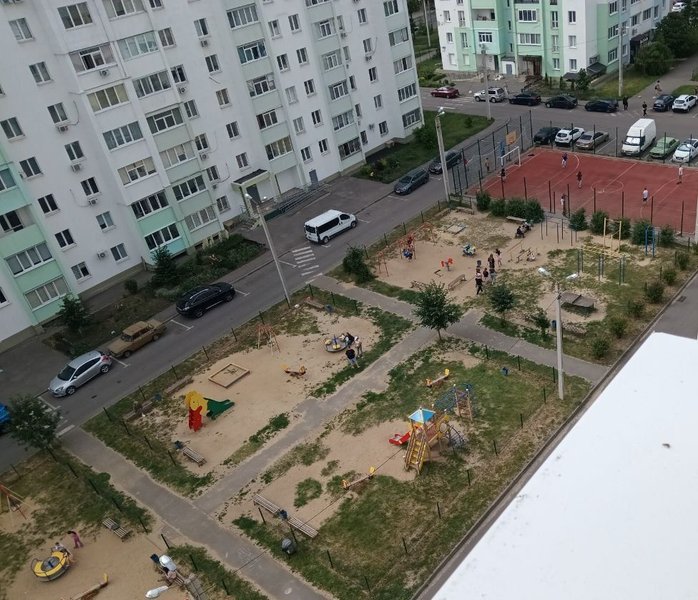Book Review: "You Don't Know What War Is - The Diary of a Young Girl from Ukraine," by Yeva Skalietska
10 comments
I Picked a Bad Time to Read This
I actually had a really, really hard time finishing this one.
That's not a criticism this time though.
The reason is because I picked this one up off a shelf in Barnes and Noble, two days after
, and didn't know what I was in for. See, the title and the cover tell you that this is the wartime diary of a young girl who fled Ukraine. What I didn't know from the cover is which city.And of course, she was from Kharkiv: the . I got about 12 pages in and had to put the book down because frankly, it brought on too many flashbacks. I'm glad I finally did resolve to go back and finish it though.
Starts With a Birthday
The book is an English translation of an actual diary, which was given to young Yeva Skalietska on her 12th birthday (and for the record, birthdays are a significantly bigger deal in the post-Soviet world than they are in the West; probably because for decades they lived surrounded by reminders that any birthday could be their last). Her first entry (which was apparently written later because it ends with a foreshadowing of how much would change ten days later) describes her birthday party in Nikoslky mall, which was a block away from Metrostantsiya Maidan Konstitutsyii (Metro Station: Constitution Square), which was where I always got off the red line when coming from Industrialnyii. She makes a mention that it was at a bowling alley, and I grinned as I read it and said "oh, Lucky Strike; fourth floor. Also the only place in the city that I knew of with air hockey tables." And after reading about such a familiar location, I checked the date she mentioned and it was a bit odd to think it but it occurred to me I was actually in that mall at the time of the party she was describing.
And that's when I had to put it down for the first time, as I thought of what Nikolsky, the site of so many of my own memories, looked like less than a month later.
Before Russia's "De-Nazification"...

After Russia's "De-Nazification"...

But I digress. Back to the book itself.
Children Shouldn't Know How This Feels
The first thing I noticed after the first entry is that the days in the diary are not listed by date (at least in the first half), but by what day of the war is being described: "Day 1, Day 2," etc. That by itself sent one hell of a message. For those of us who were living it, the onset of the genocidal assault on the Republic of Ukraine by
divided time into two categories: "before this," and "after this." For the Children of Ukraine, February 24, 2022 was "Day 1" of a new and far darker world, and somehow a 12-year-old girl managed to make that plainer than any of us adults who tried to capture it in words have yet managed to do.As for me, I found myself noting each date and asking "what was I doing then? Oh, this was the day I arrived in Warsaw," or "this was the day I went back to Lviv to help evacuees," or "oh, that was the day Mila and her daughter crossed the Polish border," and so forth.
The author then describes, with Slavic stoicism and the plain and simple frankness of which only children are capable, the roughly two weeks she endured the bombardment of her home city before escaping. The book has been criticized by one or two self-righteous Western reviewers for being "amateurly-worded," to which my response is "what did you expect? The author was 12!" As such, a historian looking for clues about what weapons were used where, what troop movement happened in what parts of the city, what sort of effect the invasion had on the geopolitical views of the Russian-descended population, will find precious little of value here. What you will find is the raw, unfiltered sense of what it felt like to be one of the civilians whom that parasite Lavrov claims his barbarians aren't targeting.
She also does not try to hide the aspects that Ukraine would prefer the rest of the world not to focus on, such as the rumors which briefly swirled around in Kharkiv that Ukraine's tanks were hiding among schools and her grandmother's fear that they would be used as Human shields, or the fact that her grandmother came from Russia and didn't believe Putin was actually interested in starting a war, a sentiment .
It's not the most eloquent description of war ever written by those who have seen it. What's gut-wrenching about it is that a child of this age is able to give an eyewitness testimony to this kind of atrocity at all.
But Then She Escapes. So All Is... Well?
There is a point at which the book shifts tone from terror to the combination of relief, guilt and despair that commonly gets lumped together and labelled as "survivor's guilt" by suits and ties with impressive-sounding psychiatric credentials and no God-damned clue at all how the real world actually works. The clearest sign of this change is when the author stops listing entries by how many days into the war she is, and by what the calendar says. Again, the message is pretty clear: "I'm now out of the war. It's time to try and live a normal life and think about school and making friends, like everyone else in the world who is my age, instead of wondering if I will live to see morning... So, how does 'normal' work again?" If I had the above-mentioned psych credentials I'd probably say the author is suffering from PTSD.
At the age, of 12.
Anyway...
...this change is the point where a lot of reviewers say they lost interest in the book, basically because it no longer satisfies the "I want to read about innocent people dying so I can frown somberly and feel morally superior" fetish that characterizes the lotus-eating, pompous, entitled little pukes who make up the population of the West. For anyone actually literate though, the book has still another point to deliver. Even the days that the author describes positively, end with tears over lost friends and a lost way of life, and fears about friends who have not yet gotten out.
It sounds trite to say "you can take the survivor out of the war but can't take the war out of the survivor," but that's pretty much how it is and that's precisely the point that one gets by reading Yeva's diary. The book shows that for the survivors of Putin's War, escape isn't escape: the horror goes with you.
So Who Should Read It?
When I wrote my review of Jamyang Norbu's
By the same token, If I held a political office that had this kind of power, I'd hand out a copy of this book to everyone living in Europe, Canada or the US, and inform them they had 21 days to read it and write a review proving they'd done so, or face jail time. For anyone who wonders what a country looks like after Russia has "demilitarized it" from imagined "Nazis" that don't exist anywhere except , this young girl from Kharkiv, a mere twelve years old (thirteen now) has painted a crystal clear portrait.
To everyone in the West who still thinks Russia's wholesale massacre of civilians is "not as bad as the media makes it sound," read.
To everyone in India, Serbia or any of Russia's other sycophantic allies trying to say "Russia is the good guy here, resisting Western Imperialism (by engaging in openly-stated imperialism against a country that has never had a colony, except of course for a penal colony called Moscow), read.
To everyone who thinks "oh, Ukrainians are better off under Russia than they were under 'tHe KiEv ReGiMe' (by which they mean, the democratically elected Ukrainian government, put in place by throwing out an openly-confessed Russian puppet named Yanukovich), read.
To anyone else in the world who is still, at this late hour, trying to make excuses for Russia, I really have nothing left for you but four letter words, and the only one fit to print is an instruction: read!
There's no excuse left for denial.
Just, read it.





Comments